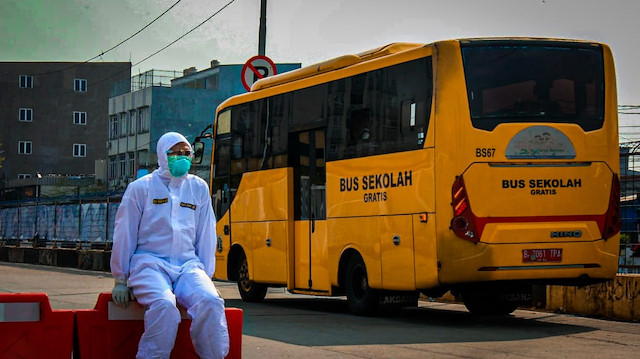
School bus drivers brave risks, tough work conditions in new role ferrying COVID-19 patients
As the coronavirus outbreak in Indonesia worsens by the day, authorities have been forced to use school buses to transport patients in the capital Jakarta.
Luswanto, a 29-year-old school bus driver, has taken hundreds of COVID-19 patients to Jakarta’s Wisma Atlet Emergency Hospital.
Buses like his have been modified to accommodate patients, with partition shields installed to protect the drivers and health workers.
“The COVID-19 evacuation team has to be on standby at all times. We must be ready to move at a moment’s notice,” he said.
His shift starts at 4 a.m. (2100GMT, a day earlier) and, with no fixed end time, can even go on for 24 hours.
“There have been days when my colleague and I have picked up patients until 3 a.m. [2000GMT, a day earlier],” said Luswanto, who goes by just one name.
“We could be running between three different locations and transporting more than 100 patients in a day.”
Jakarta, which remains the Indonesia’s worst-hit region, has more than 12,200 active coronavirus cases so far.
Infections in the capital are increasing by more than 1,000 every day, 50% of them being asymptomatic cases, according to health authorities.
Most of the patients Luswanto has transported fall in the latter category.
“Many of them didn’t look sick; they looked fresh and in good shape. There were children carrying toys, pregnant women, and people with disabilities,” he said.
For Luswanto, the most challenging part of the job is to drive completely donned in personal protective equipment (PPE), including a hazmat suit, mask, gloves, and goggles.
Going without food and water for hours at end have become a norm for the 29-year-old since “taking off the PPE would be very inconvenient.”
“We also have to bear the heat as the air conditioner needs to be off. My colleague once fainted due to dehydration,” he told Anadolu Agency.
Adding to the workload is the fact that the bus has to be disinfected and washed at least three times at the end of each shift.
Going home is another point of concern for Luswanto, with the risk of infecting his family weighing heavy on his mind.
“My children have to stay in their rooms when I get home. I go straight into the shower and make it a point to mop the floor when I’m done,” he said.
Like hundreds of other people leading the fight against the pandemic, Luswanto desperately wants people to realize the risks and follow safety rules so “these tiring days can end as soon as possible.”
“COVID-19 really exists; it is real and it really happens. I can only hope that people out there always comply with health protocols so that [the situation in] Jakarta can improve,” he said.
Hello, the comments you share on our site are a valuable resource for other users. Please respect other users and different opinions. Do not use rude, offensive, derogatory, or discriminatory language.
The floor is all yours.








